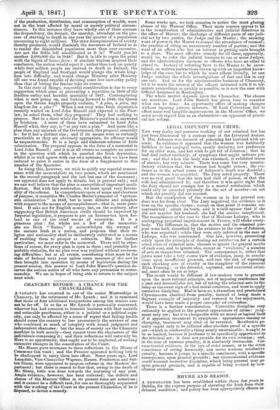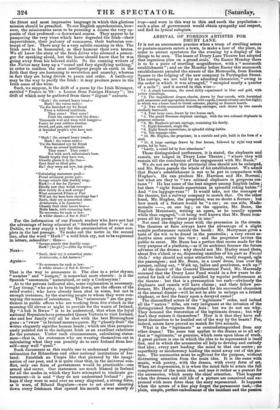RHYME AND REASON.
A NEWSPAPER has been established within these few years in Dublin, for the express purpose of elevating the Irish from their debased condition ; and poetry has been appropriately chosen as
the fittest and most impressive language in which this glorious mission should be preached. To our English apprehensions, how- ever, the missionaries seem to be pursuing a course the very op- posite of that professed—a downward course. They appear to be pampering the very vices which have degraded the Irish—their improvidence, their jealousy of commerce, their barbarian con- tempt of law. There may be a very subtile cunning in this. The Irish need to be humoured, as they humour their own brutes. We all know the story of the Irish driver who silenced a passen- ger for speaking aloud, lest the horse should know that he was going away from his beloved stable. So the cunning writers of the Nation may keep up a "sound and fury signifying nothing," in order to confirm the most intelligent people on earth in the faith that they are hastening to revolution and anarchy, whereas in fact they are being driven to peace and order. A battle-cry may be the way to pacify the Irish : it may produce peace in the Irish sense of the term.
Such, we suppose, is the drift of a poem by the Irish B6ranger, entitled " France in '93 : a Lesson from Foreign History " ; the drift of which may be gathered from these " iligant " extracts.
" Hark I the onward heavy tread—
Hark ! the voices rude- 'Tis the famished cry for Bread From a wildered multitude.
They come! They come! Point the cannon—roll the drum;
Thousands wail ar.d weep with hunger—
Faster let your soldiers number.
Sword, and gun, and bayonet A famished people's cries have met. • •
" Hark ! the onward heavy tread—
Hark ! the voices rude- 'Tis the famished cry for Bread From an armed multitude.
They come! They come! Not with meek submissions hum.
Bloody trophy they have won,
Ghastly glares it in the Sun—
Gory bead on lifted pike.
Ha! they weep not now, but strike.
"Calculating statesmen quail—
Proud aristocrat grows pale; Savage sounds that deathly song: Hark !—/1 bas les Tyrans!
Blindly now they wreak revenge—
How rudely do a mob avenge!
What coroneted Prince or Peer Will not the base-born slavelings fear?
Sooth, their cry is somewhat stern: Aristocrats, a la Lanterne!
Ghastly fruit their lances bear—
Noble heads, with streaming hair; No reverence for rank or law: A wilder shout—A bask Roil "
For the information of our French readers who have not had the advantage of being educated at " Stratford atte Bowe," or in Dublin, we may supply a key for the pronunciation of some cou- plets in the last passage. To make out the metre in the second line, after the word " Hark!" a wild Irish cry, not to be expressed in letters, subauditur : thus- " Savage sounds that deathly song:
Hark! [ho-gh!]—Abba lay thong!"
"Sooth, their cry is somewhat stem: Aristocratts, a lah lanturn!"
"No reverence for rank or law: A wilder shout—A bah le Rwaw!"
That is the way to pronounce it. The clue to a prior rhyme, " number " and "hunger," is somewhat more obscure : is it the Spanish "assonancia" naturalized, or only a Cockneyism ?
As to the persons indicated also, some explanation is necessary. "Lay tirong," who are to be brought down, are the officers of the relief works ; who have already been shot in some, but not in enough instances, by the starving people to whom they were con- veying the means of subsistence. The "aristocrats" are the gen- tlemen in public offices who are working from rive o'clock in the morning till eleven at night to provide for the wants of Ireland. By "A bah le Rwaw " is to be understood, that when the loyal national Repealers have persuaded Queen Victoria to visit Ireland, she and her family will all be shot with the best Birmingham guns : a "rwaw " in Ireland means a queen. By "ghastly fruit" the writer elegantly signifies human heads ; which are thus perspicu- ously pointed out to the indigent Irish as an excellent substitute for the potatoes. Under such circumstances, calculating states- men—that is, the statesmen who are wearing themselves out in calculating what they can possibly do to save Ireland from her- self—may well " quail."
Such documents as this enable one to understand the popular estimation for Ribandism and other national institutions of Ire- land. Establish an Utopia like that pictured by the imagi- nation of our poet, and it is quite clear that, in the universal con- flict, only one form of government would be practicable—one armed and secret. Our statesmen are much blamed in Ireland for all the modes in which they have attempted to vindicate go- vernment—it is said "they do not understand Ireland " : per- haps if they were to send over an army disguised, a strong force, as it were, of Riband Regulars—were to set about shooting down every Irishman that opened his mouth or was merely de
Next— Again—
trop—and were in this way to thin and sooth the population— such a plan of government would obtain sympathy and respect, and find its lyrical eulogists.



































 Previous page
Previous page